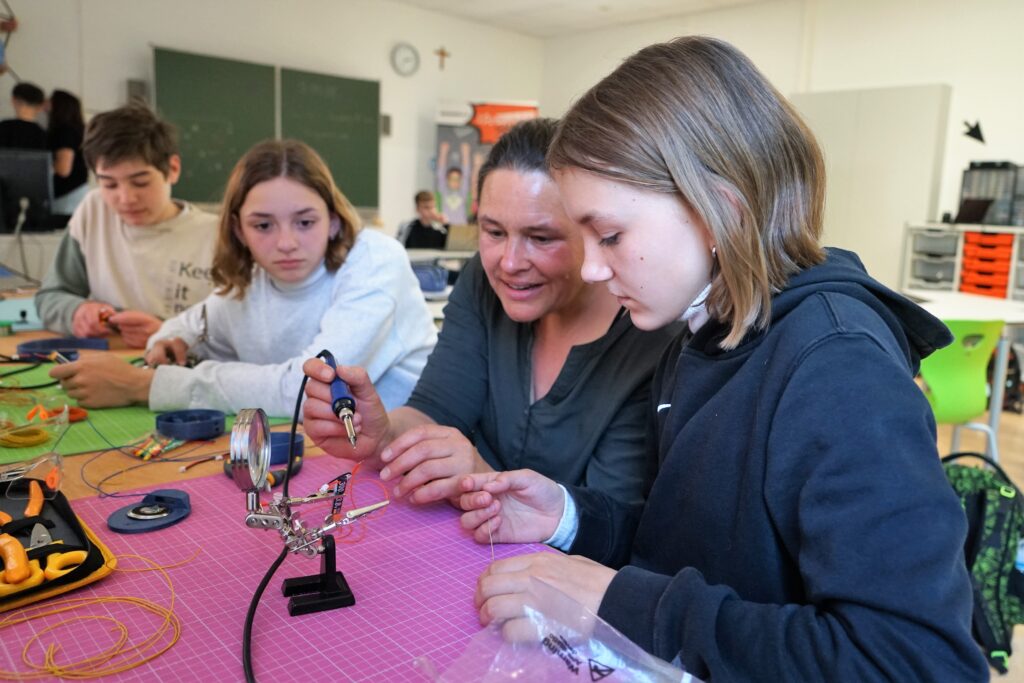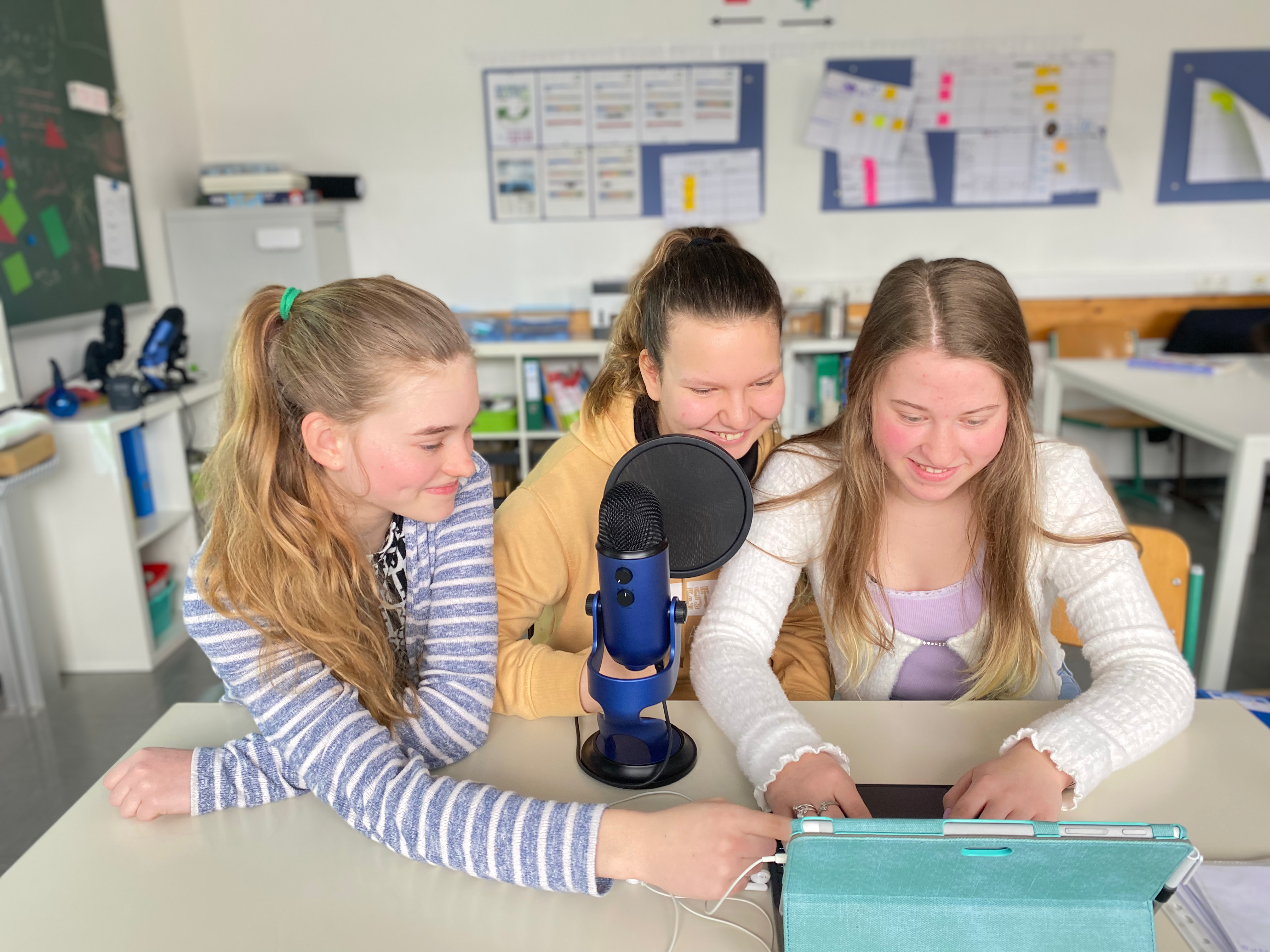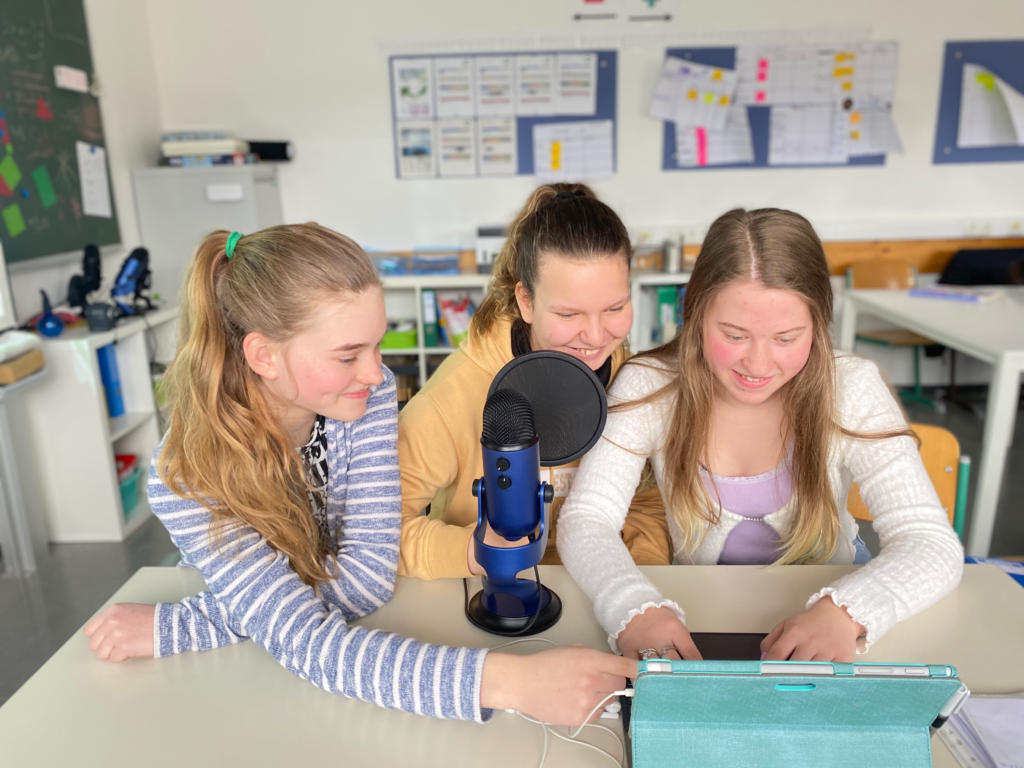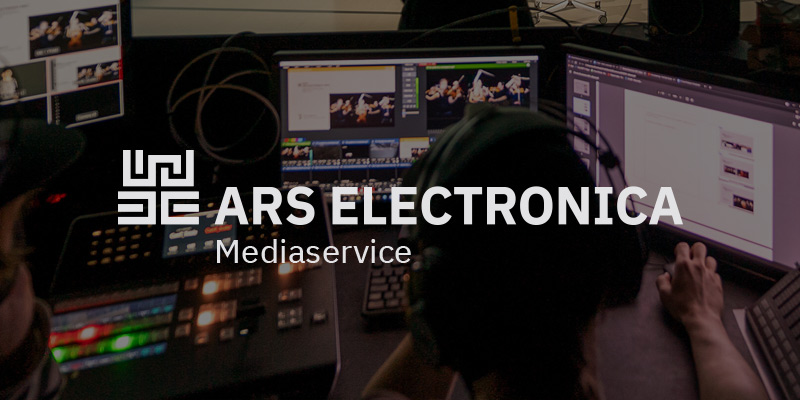The winners of the education prize awarded by the national education agency OeAD, the Federal Ministry of Education, Science and Research (BMBWF) and Ars Electronica have been announced.
- press release as PDF
- More about Klasse! Lernen. Wir sind digital. & the prize winning projects
- Images via Flickr
(Linz, June 26, 2023) Since November 2022 at the latest, it has been clear that the digital transformation will have a disruptive impact. The release of Chat GPT3 was a watershed – not a technical one, but a social and political one. All areas of society are facing major challenges, and this is especially true for the education system. Here, awareness, knowledge and skills want to be imparted and not just in relation to new technologies, but through their use. That’s exactly what OeAD, BMBWF and Ars Electronica want to achieve with the education award “Klasse! Lernen. Wir sind digital” More than 140 best practice projects from all over Austria were submitted between November 2022 and April 2023. A jury awarded the best ten of them: 7 Honorary Mentions, 2 Awards of Distinction endowed with 5,000 euros each, and a main prize endowed with 10,000 euros.
“The impressive submissions demonstrate that both students and teachers are using digital devices to collaborate on content and creatively use it in the classroom. Compared to last year, the teams at school are using digital devices in different subjects, on different topics, showing that the use of digitization is a right step to teach learning in a holistic way. The OeAD, as the national education agency, supports schools on this path with its services,” emphasizes Jakob Calice, Managing Director OeAD.
The jury members were: Jakob Feyerer (AT), Simon Prossliner (OeAD), Elisabeth Rosemann (AT), Matthias Schoiswohl-Szwajor (AT) and Petra Siegele (OeAD). The main prize of 10,000 euros goes to the Eggenburg Music Middle School for the He[a]rophone project, while the Phönixschule – digiTN Middle School Attnang-Puchheim (PODix – Phönixschule ON AIR) and the BG/BRG Pichelmayergasse in Vienna (Freifach Game Design) each receive 5,000 euros.
“Advancing digitalization is creating more and more new opportunities for lesson design. With the education award ‘Klasse. Lernen! Wir sind digital’ the Ministry of Education supports a platform to present concrete application possibilities of the use of mobile digital devices for the promotion of collaborative learning to a broad public. Smartphones, tablets and laptops make it possible to design collaborative learning in a flexible way. The digital school thus promotes new forms of teaching!” says Martin Bauer from the BMBWF, underlining the high relevance of this education award.
What is digital learning?
Online platforms and infrastructures that bundle knowledge and convey it in an intuitive, playful way; smartphones, tablets and laptops that provide access to this knowledge anywhere and at any time; and, and, and. Digitization is creating many new opportunities for learning and teaching. This is precisely what the education award ” Klasse. Lernen! Wir sind digital” aims to convey. Support for all those teachers and students who see digitized teaching as an opportunity to develop and test exciting ideas and projects is necessary. The focus is never on the mere operation of devices in the sense of their inventors, but on the creative, innovative and sustainable use of these digital tools. The Austrian competition aims to show the innovative potential of a multi-layered use and sustainable anchoring of new technologies in daily school lessons by means of the award-winning best-practice projects. At the same time, the competition wants to stimulate critical questioning: Which structures should and can be meaningfully expanded with digital tools at all? And which elements of school teaching will absolutely need direct social interaction in the future?
Klasse! Lernen. Wir sind digital. – the education award for Austria
The education award “Klasse! Lernen. Wir sind digital” was initiated in 2022. The Austria-wide competition is aimed at teachers who implement innovative projects together with their students. The award is not given to schools or institutions, but to teachers and students. School classes or teams of students in the 4th grade of elementary school and lower secondary school and their teachers are eligible to submit projects. The most important submission criteria include transformation (What new processes are needed in everyday school life in order to be able to use digital tools in a meaningful way?), sustainability (How can digitization be sustainably anchored at the school location? How can digital competencies of students be promoted in a sustainable manner?), Innovation (Which innovative approach creates the greatest space for change and new ideas in the respective context?) and Creativity (How can digital school be implemented as creatively as possible?).
Klasse! Lernen. Wir sind digital. / Main Prize 2023
He[a]rophone
- School: Eggenburg Music Middle School
- Subject: MINT
- School group: Focus MINT
- Students: Fabian A., Luca B., Lena B., Jonas D., Lena D., Leni D., Sophie D., Valentina H., Fabian K., Tobias L., Luca L., Lisa-Marie M., Marlon P., Nina Sch., Luca S.
- Teachers: Nora Dibowski, Karin Krottendorfer-Stift, Petra Roitner
- Project idea: Judith Grafinger
„He[a]rophone convinced the jury with a versatile, well thought-out and sustainable concept: The ‘open learning space / STEMSpace’ designed for the project will serve as an experimentation and training zone in the future, and the listening station developed as part of the project can also be placed very flexibly. […] This project is seen by the jury as a unique starting point for further digitization projects.“
Statement of the Jury
This project is seen by the jury as a unique starting point for further digitization projects. Since the He[a]rophone project, the “Future Room” at the Eggenburg Music Middle School (Lower Austria) has provided a collaborative learning atmosphere away from the classroom: With the support of experts from the fields of design, architecture, electronics and computer science, students experiment and work creatively at this open learning space. A soldering station, tool walls, 3D printers and an electrical area encourage people to discover the interface between digital and analog technologies. The first joint project is already in the starting blocks: a mobile listening station, the He[a]rophone, a jointly developed learning tool that can be used in the school library and directly in the classrooms.
The idea of the young developers is not simply to share audio worlds, but above all to design them themselves – from the creation of the hardware to the content. The self-built He[a]rophone can currently play music, audio books and podcasts. For its sustainable concept, He[a]rophone receives the main prize in the competition “Klasse! Lernen. Wir sind digital“.
Klasse! Lernen. Wir sind digital. / Awards of Distinction 2023
PODix – Phönixschule ON AIR
- School: Phönix school – digiTN middle school Attnang-Puchheim
- Subject: Digital basic education
- School group: 3a and 3b (2022/23)
- Teacher: Thomas Schwaiger
„The students have demonstrated outstanding creativity and linguistic diversity in their use of digital media and showed how different cultures can enrich one another. Multilingualism in the classroom is a definite bonus.“
Statement der Jury
The students of the Phönix school (Upper Austria) not only consume podcast applications, but also create them themselves. In doing so, they use a competence that is central to their everyday school life and is seen as a great bonus: Multilingualism. The editors work together on school topics and demonstrate how to deal with digital worlds in a reflective manner and the relevance of language diversity in information media. With an eye for the comprehensible preparation of learning content, the students use appropriate programs to create complex audio contributions – and not only in German.
Freifach Game Design (Elective subject Game Design)
- School: BG/BRG Pichelmayergasse, Vienna
- Subject: Free subject / non-binding exercise “Game Design
- School group: Students in grades 5 to 8
- Students: Andrew B., Benjamin B., Adrian C., Louis Ch., Lennox D., Linda D., Tolga E., Nina F., Adrian G., Adrian K., Sophie K., Imran L., Mohammed N., Maximilian O., Vivian P., Emilio R., Nico S., Maximilian Sch., Nicholas St., Marie St., Selin U., Noorjahan Z., Omar Z., Osman Ö.
- Teacher: MMag. Till Weinhold
„The elective subject Game Design at Pichelmayergasse High School gives students across grade levels an interdisciplinary exploration space to strengthen their 21st-century skills. […] The project also reflects the successful establishment of a teaching concept developed based on the students’ interests at the school that overcomes structural and institutionalized barriers.“
Statement of the Jury
The elective subject Game Design of the BG/BRG Pichelmayergasse (Vienna) challenges the students to deal with digital games, their content, their conception and the technical possibilities. Even analog games require certain strategies and “chess moves” – but how can this be transferred to the digital world and where are the similarities? This is the question that participants address at the beginning before they design and implement their own digital applications. Inspiration and support are provided by events such as the Vienna Games Festival (Wiener Spielefest) and discussions with professional game designers. As part of the curriculum, the students combine knowledge from language, art, mathematics and technology and create games according to their own ideas.
Klasse! Lernen. Wir sind digital. / Honorary Mentions 2023
4CD – Fablab Ursulines Innsbruck
- School: Gymnasium Ursulinen Innsbruck
- Subject: Handicrafts
- School group: 4CD
- Teacher: Peter Hausegger
„The 4CD – Fablab Ursulinen Innsbruck impressively demonstrates how students can apply the methods they have learned, from brainstorming to implementation to troubleshooting, in a practical and enjoyable way. […] The Fablab provides a space for learning, consolidating basic skills for digital production, and exploring new technologies autonomously.“
Statement of the Jury
Solution-oriented and independent work is the top priority of the teaching concept at the Fablab of the Ursulinen Gymnasium in Innsbruck. Equipped with a 3D printer, cutting plotter, laser cutter and microcontroller, the students have a playground of new technologies at their disposal that encourages them to implement their own ideas and freely chosen projects. The students of the work group 4CD have effectively used these possibilities and experimented with digital fabrication and robotics – the creative process was accompanied by teachers for a semester. A remote-controlled boat, moving robots and a specially programmed distance meter are just two examples of the impressive results.
Digitale Schnitzeljagd – Weg der Nachhaltigkeit (Digital Scavenger Hunt — Path of Sustainability)
- School: Elementary school Stattegg
- Subject: Handicrafts, visual arts, science lessons
- School group: 4th grade
- Students: Sophie A., Petra B., Julia B., Niklas D. Ina H., Vera J., Valentin K., Xaver K., Nino L., Marlene L. Helena M., Elena R., Emely S., Valentina S., Alexander U., Alexander V, Vanessa V., Franz W., Sebastian W., Markus W.
- Teacher: Mag. Michaela Köhler-Jatzko
„This project Digitale Schnitzeljagd – Weg der Nachhaltigkeit (Digital Scavenger Hunt — Path of Sustainability) at Stattegg elementary school facilitates an exciting and interdisciplinary teaching and learning experience on the topic of sustainability. Through the harmonious combination of craftsmanship expressed through clay sculptures and digitalization and gamification within a scavenger hunt app, a diverse exploration of the United Nations’ Sustainable Development Goals (SDGs) is achieved.“
Statement of the Jury
The United Nations has agreed on 17 Sustainable Development Goals (SDGs) – the 4th grade of Stattegg Elementary School (Styria) has been working on these SDGs. Under the school’s annual theme “Fair Response”, the project Digital Scavenger Hunt – Path of Sustainability was designed. The students designed ceramics and created a digital quiz with the app “Actionbound”. All the riddles and content were worked out together and entered into the digital application, and the ceramic objects were placed around the school building. The result was a sustainability trail that, thanks to the app, becomes an interactive experience for children, parents, teachers and other visitors from the community. Those who try it out can call up information at each station, answer questions, complete tasks or take photos. A point system makes engaging with issues of sustainable resource use a challenge with meaning.
Credits: Project partner atempo. As an employee of atempo, Barbara Schmid is responsible for the implementation of digital-creative school projects.
Film Project “Lesenacht” (Reading Night)
- School: Paulinum Episcopal Gymnasium, Schwaz
- Subject: German, music, school model “Paulinum
- School group: approx. 50 students of 2B and 2C
- Teacher: Sonja Fuchs
„The film project Lesenacht (Reading Night) is convincing due to the motivation and incredible enthusiasm of all students and teachers involved. […] The project, which involves different school grades and cross-curricular teaching and learning, makes it possible to experience the various steps of a film shoot and impressively conveys the difference between self-filmed cell phone footage and professional film production.“
Statement of the Jury
The Paulinum Episcopal Gymnasium in Schwaz (Tyrol) is currently the location for the scary film Lesenacht (Reading Night) – 50 students from 2B and 2C are responsible for the script, filming, scenes, sound recordings, makeup, and conception. As part of the project, the young people learn various film techniques and camera angles, get to grips with sound and editing programs, and work independently on topics that really interest teenagers. Half of the fictional story about a break-in at school and an old school scandal has already been shot, and the final result is expected in September 2023.
Gamification – Motivation zu Lernen (Gamification – Motivation to study)
- School: Middle school Kematen
- Subject: Non-binding exercise robotics
- Teacher: Matthias Erhart
„The Gamification project completely rethinks school performance assessment and learning incentives for students. […] Learning incentives are set in a playful way and digital skills are taught through the close involvement of the students in the application development.“
Statement of the Jury
A learning app by students for their own lessons; this is the project that students at the Kematen Middle School (Tyrol) have taken on. Under the motto “Gamifaction,” the game developers are working on learning content with playful elements that encourage students to acquire subject knowledge independently and continuously – in class and beyond. Programmed interim goals and small successes are designed to increase and maintain motivation. Depending on their age and experience, the students contribute to all development steps, working out plans, drawings, system tests, raw data tables and game concepts as part of the development phase.
Mit Wasser für die Umwelt (With Water for the Environment)
- School: Lower Austrian Secondary School Lunz am See
- Subject: Chemistry, physics, project lessons
- School group: Bildungscampus Lunz am See: 4th grade and 2nd grade MS, 1st grade VS
- Students / 4th grade: Dominik F., Leon H., Samuel H., Andrea H., Tim J., Florian L., Gabriel M., Amelie M., Theresa P., Jonas P., Christoph S., Valentina S., Lukas S., Nikolaus St., Eric W.
- Students / 2nd grade: Magdalena G., Elina M., Julia L., Sara S.
- Teachers: Mag. Valentina Leitner, Lisa Paumann BEd.
„Starting with experiments on water properties, this project includes experiments, a visit to a sewage treatment plant, cooperation with the research station Wassercluster, but also the documentation and presentation of the project results so far and the development of learning materials.“
Statement of the Jury
The project Mit Wasser für die Umwelt (With Water for the Environment) of the secondary school Lunz am See (Lower Austria) promotes awareness of the diversity of the basic element water and was developed in cooperation with research institutions and experts. Equipped with knowledge of chemistry and physics, the students turned their attention to water as a resource and analyzed its importance for the ecological balance. A Pixi book including a “researcher’s box” was the creative output of the project, the findings of which have already been presented at a public exhibition. Impulse lectures and discussion presentations followed. The jury was particularly impressed by the Peer2Peer idea: the fourth grade of the middle school invited their younger colleagues from the first grade of elementary school to experiment together with the materials they had developed – here, learning together effectively became a teaching format.
Credits: Cooperation with the water cluster Lunz am See (Boku, University of Vienna and Danube University), market community Lunz am See, lawyer Mag. Marlies Teufel and BGM a. D. Martin Ploderer.
Seifenwerkstatt 4.0 (Soap Workshop 4.0)
- School: GRG13 Wenzgasse, Vienna
- Subject: Handicrafts
- School group: 2.E
- Students: Leonie B., Samir C., Lenya F., Philipp G., Benedikt H., Nicolas H., Esther J., Alexander K., Clemens K., Hemma K., Leonard K., Luca K., Maximilian K., Toni K., Alika L., Leonidas L., Lilly L.,
- Teacher: Julia Grandegger
„The Soap Workshop 4.0 shows how digital and analog work can function in the context of the subject Handicrafts. […] The inter-technological approach, promoted by a high degree of individuality, is extended by the implementation of digital manufacturing processes and the interweaving of digital and analog techniques.“
Statement of the Jury
Creative and sustainable work is on the timetable in the handicraft classes of GRG13 Wenzgasse (Vienna), because the project Soap Workshop 4.0 (Seifenwerkstatt 4.0) refers to the (added) value of packaging and its recycling potential. Instead of classifying collected tetra packaging as waste, the work group created soap molds from the material and developed their own artistic designs. From soap production to packaging to individual logos, the students independently designed final products and thus playfully took on the role of producers in the real market.
Credits: Thanks to the specialist group for handicrafts
Wir stehen unter Strom! Wir stehen unter Strom! (We are under pressure!)
- School: Elementary school August Tielmann, Telfs
- Teacher: Anna Zigala
- Subject: Non-binding exercise robotics
„Overall, this project provides a unique opportunity for children to explore energy topics, improve their technical understanding, and learn from each other. […] An all-round enriching and inspiring project that motivates the children and awakens their enthusiasm for technology and energy.“
Statement of the Jury
Electricity generation and consumption are complex matters whose backgrounds are not easy to grasp at first glance – the August Thielmann elementary school in Telfs (Tyrol) has taken up this challenge. Based on a visit to the pumped-storage power plant Sellrain-Silz, research in the library and by means of online media, the pupils were challenged to develop their own electricity system with storage lake, run-of-river power plant and wind turbines out of LEGO. In the process, the children showed great interest in energy generation and also developed a residential house with a solar system to secure another source of energy. With the help of SmartHubs and tablets, the Lego factory was consequently brought to life – their own version of the future as seen by the students in Telfs.
Further information on the projects can be found here.

Main Prize: He[a]rophone
Photo Credit: Music Middle School Eggenburg, Karin Krottendorfer-Stift, Nora Dibowski




